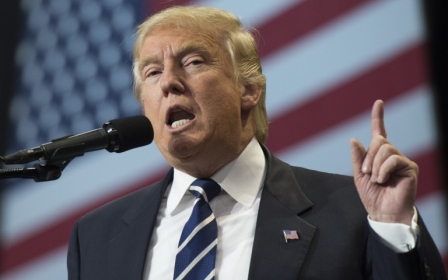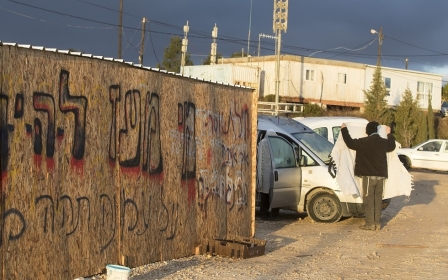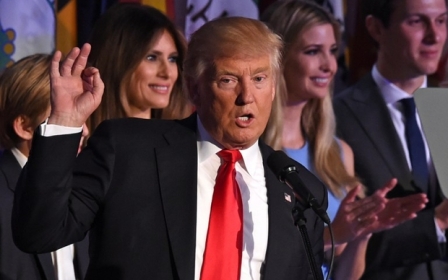Trump's ambassador to Israel: I want an embassy in Jerusalem

US President-elect Donald Trump's choice of ambassador to Israel has said he is looking forward to strengthening US-Israeli relations "from the US embassy in Israel's eternal capital, Jerusalem".
David Friedman, a bankruptcy lawyer, made the comment hours after he was appointed as ambassador to Israel on Thursday.
He said he hoped to "strengthen the unbreakable bond between our two countries and advance the cause of peace within the region, and look forward to doing this from the US embassy in Israel's eternal capital, Jerusalem".
READ: The Trump threat to Israel's security interests
Friedman, who served as an adviser to Trump on Israeli affairs, said in October that Israeli settlements in the occupied West Bank are not illegal.
A source in the office of Israeli prime ministyer Benjamin Netanyahu said the premier was "pleased" with the appointment.
"He knows David Friedman has the full confidence of President-elect Trump and looks forward to working closely with him," the source said, speaking on condition of anonymity.
Trump's pledge on embassy
Donald Trump had previously said in a statement: "[Friedman] has been a long-time friend and trusted adviser to me."
"His strong relationships in Israel will form the foundation of his diplomatic mission and be a tremendous asset to our country as we strengthen the ties with our allies and strive for peace in the Middle East."
Trump has pledged to switch the embassy from Tel Aviv, where it has been located for 68 years, to Jerusalem, all but enshrining the city as Israel's capital regardless of international objections.
But on Friday, Trump aide Jason Miller told reporters that while the president-elect still "remains firmly committed to" the move, more details "might be a little be premature ... we don't have that yet," in comments reported by Reuters.
The United States and other powers do not currently regard Jerusalem as Israel's capital.
READ: Israel on the fast track for West Bank annexation
Other nations' embassies are located in Tel Aviv and do not recognise Israel's annexation of occupied East Jerusalem following its capture in the 1967 Middle East war.
Speaking to AFP in October after a pro-Trump rally in Jerusalem, Friedman said Trump was "tremendously sceptical" about the prospects for a two-state solution to the Israeli-Palestinian conflict.
Settlements in the West Bank are in violation of international law. World powers, including Washington, view them as major stumbling blocks to peace efforts because they are built on land seized in the 1967 war, which Palestinians see as part of their future state.
Despite approving the biggest military aid package in history to Israel, the Obama administration has been critical of Israeli settlement-building.
Earlier in December, US Secretary of State John Kerry accused right-wing Israelis of deliberately thwarting efforts to broker a peace deal with the Palestinians.
"I'm not here to tell you that the settlements are the reason for the conflict, no, they're not," Kerry said.
"But I also cannot accept the notion that they don't affect the peace process, that they aren't a barrier to the capacity to have peace."
Friedman backs illegal settlements
Before becoming Trump’s adviser on one of the most contentious issues in the Middle East, Friedman had worked for the billionaire as a bankruptcy lawyer.
He is also the president of the American Friends in Beit El Yeshiva, a group that supports an illegal settlement near Ramallah.
READ: Trump USA means big trouble for 'Brand Israel'
"We're taking the view that the Israelis have just as much of a right if [not] a much greater right to Judea and Samaria as the Palestinians," Friedman said in a radio interview in November, using a Jewish religious name for the West Bank.
Trump has pledged to break with decades of diplomatic traditions and move the US embassy in Israel to Jerusalem from Tel Aviv, with media reports claiming that he is already eyeing a site for the new embassy.
Middle East Eye propose une couverture et une analyse indépendantes et incomparables du Moyen-Orient, de l’Afrique du Nord et d’autres régions du monde. Pour en savoir plus sur la reprise de ce contenu et les frais qui s’appliquent, veuillez remplir ce formulaire [en anglais]. Pour en savoir plus sur MEE, cliquez ici [en anglais].




